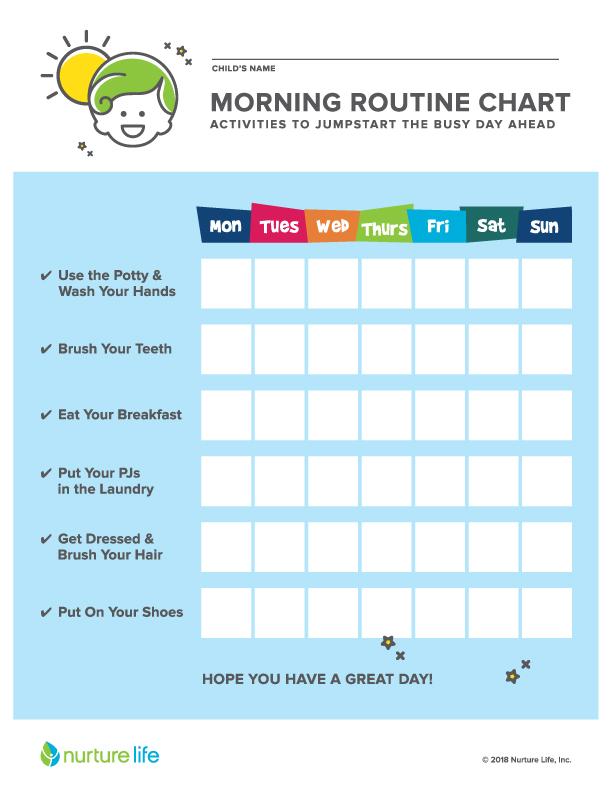How to Make the Perfect Toddler Schedule for Your Child
To a toddler, the world can be a pretty overwhelming place. Whether they’re learning new words or mastering motor skills, every day is filled with new possibilities and opportunities for growth. It’s certainly an exciting time, but it can also feel a little scary—for both toddler and parent!
Though there’s no guarantee that things will always go perfectly as planned, setting a daily toddler schedule for your child can help them feel safe and secure, which can keep their emotions (and meltdowns) in check. For example, if your little one knows to expect a healthy snack at a certain time of day, they’ll likely develop the patience to wait until snack time rather than become fussy the instant they feel hungry.
Toddler schedules and routines can also guide parts of the day that are sometimes problematic, such as bedtime. If your child knows that certain activities (cleaning up toys or brushing teeth, for example) cue the beginning bedtime, they’ll have more time to adjust to the idea of going to sleep. Getting a handle on each day’s activities can also boost your toddler’s confidence. When they can predict what’s ahead, they’ll likely feel more sure of themselves, which will help them be more open to trying new things.
Not sure where to begin in devising a daily toddler schedule? Try a routine chart for toddlers. A toddler routine chart is a fun way to get your little ones actively involved in their schedule. It can also be a helpful tool to frame their day. Get a kid-friendly routine chart that is simple enough for them to understand, and fill it out together throughout the day. Once you have your toddler routine chart, try these 9 tips to round out your toddler’s schedule.
Tips for Developing the Right Toddler Schedule for Your Child
Start by developing your toddler schedule with morning and evening routines
The beginning and end of the day are often the most challenging times, simply because there’s a lot to do—from getting ready for preschool to taking a bath before bed. Focus on mastering your toddler’s morning and evening routine first, since these will help the rest of the day go well.
Use your child’s cues to shape your toddler schedule
Is there a specific time when your child prefers playing? Reading? Napping? Shape your routine off your toddler’s behavior. Their schedule will feel more natural to them, and you’ll likely have a better chance of sticking to the plan.
Stick to the same wake-up time and bedtime
Though it might be tempting to let your child sleep in on the days they want to, try to stick to the same wake-up time and bedtime each day. A uniform sleep schedule keeps daily naptime regular, which will facilitate a smoother day for you and your child. Generally, toddlers should wake up between 6 and 8 am, and they should go to bed between 7 and 8:30 pm.
Don’t forget naptime
As if you would! Naps are critical for a toddler’s growth and overall wellbeing. If the length that your child naps seems to vary greatly, aim to create consistency. Remember this general rule of thumb: Toddlers should get about 12-14 hours of sleep, including an afternoon nap that lasts 1-3 hours. Younger toddlers might take 2 naps a day, but be careful not to schedule the second one too close to bedtime.
Schedule quiet time
When planning a routine, you may find it tempting to fill every minute with an activity. Remember to pencil in quiet time to give your toddler (and you) a break. Quiet time doesn’t have to be boring, either—try coloring books, a toddler-level puzzle or a board book they can flip through on their own.
Keep your toddler’s eating schedule as consistent as possible
Just like their sleep schedule, toddlers thrive when mealtime and snack time are consistent. They should eat 3 balanced meals each day (focus on vegetables, healthy grains and lean proteins) and maybe 1 or 2 snacks. Start your toddler’s morning with a balanced breakfast served at the same time and place to make eating a regular ritual. Consistent mealtimes and snacks help toddlers establish a positive relationship with food, which leads to healthy eating habits.
Talk through the schedule with your child
Instead of suddenly starting a new routine and expecting your toddler to go along with it, spend some time discussing each part of your day. See if your child has any questions, and make sure they understand their routine before putting it into play.
Plan for a little variety
The beauty of a routine is that it’s predictable and reliable, but that doesn’t mean there’s no wiggle room. When creating your toddler’s routine, use broad categories that allow you to change things up. Instead of scheduling “reading time,” for example, schedule “activity time,” which could mean reading, drawing, outside time or something else.
Adapt to the circumstances
Inevitably, things will come up that will potentially disrupt your routine. It could be overnight guests, vacation, a stomach bug or just a day your child is in a bad mood. Things happen—and your best plan of action is to be flexible. Stick to the routine as best you can, but don’t force anything. You’ll be able to return to your regular plan soon enough, so don’t worry about bumps in the road.
A Toddler Schedule Helps the Day Run Much More Smoothly
Setting a schedule for your toddler is one of the best ways to ensure a rested, engaged, happy child. Your toddler will feel secure in their routine, and this will help them feel comfortable exploring and learning about the world around them. A little predictability can go a long way!


